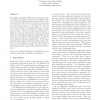Free Online Productivity Tools
i2Speak
i2Symbol
i2OCR
iTex2Img
iWeb2Print
iWeb2Shot
i2Type
iPdf2Split
iPdf2Merge
i2Bopomofo
i2Arabic
i2Style
i2Image
i2PDF
iLatex2Rtf
Sci2ools
ACSC
2005
IEEE
2005
IEEE
A Simulation Framework for Knowledge Acquisition Evaluation
Knowledge acquisition (KA) plays an important role in building knowledge based systems (KBS). However, evaluating different KA techniques has been difficult because of the costs of using human expertise in experimental studies. In this paper, we first address the problem of evaluating knowledge acquisition methods. Then, we develop an analysis of the types of errors a human expert makes in building a KBS. Our analysis suggests that a simulation of the key factors in building a KBS is possible. We demonstrate the approach by evaluating three variants of a practically successful KA methodology, namely Ripple Down Rules (RDR). The experimental results provide some fundamental insights into this family of KA techniques and suggest various hints for improvement.
Related Content
| Added | 24 Jun 2010 |
| Updated | 24 Jun 2010 |
| Type | Conference |
| Year | 2005 |
| Where | ACSC |
| Authors | Tri M. Cao, Paul Compton |
Comments (0)

